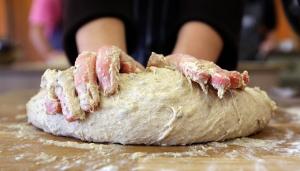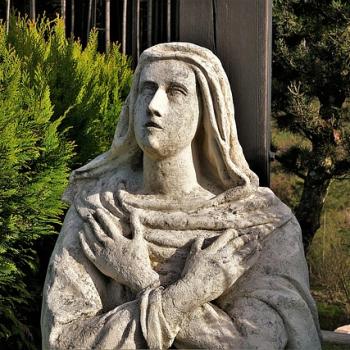
A Reading from the First book of Kings:
In those days, Elijah the prophet went to Zarephath.
As he arrived at the entrance of the city,
a widow was gathering sticks there; he called out to her,
“Please bring me a small cupful of water to drink.”
She left to get it, and he called out after her,
“Please bring along a bit of bread.”
She answered, “As the LORD, your God, lives,
I have nothing baked; there is only a handful of flour in my jar
and a little oil in my jug.
Just now I was collecting a couple of sticks,
to go in and prepare something for myself and my son;
when we have eaten it, we shall die.”
Elijah said to her, “Do not be afraid.
Go and do as you propose.
But first make me a little cake and bring it to me.
Then you can prepare something for yourself and your son.
For the LORD, the God of Israel, says,
‘The jar of flour shall not go empty,
nor the jug of oil run dry,
until the day when the LORD sends rain upon the earth.'”
She left and did as Elijah had said.
She was able to eat for a year, and he and her son as well;
the jar of flour did not go empty,
nor the jug of oil run dry,
as the LORD had foretold through Elijah.
A Reading from the Holy Gospel according to Mark:
In the course of his teaching Jesus said to the crowds,
“Beware of the scribes, who like to go around in long robes
and accept greetings in the marketplaces,
seats of honor in synagogues,
and places of honor at banquets.
They devour the houses of widows and, as a pretext
recite lengthy prayers.
They will receive a very severe condemnation.”
He sat down opposite the treasury
and observed how the crowd put money into the treasury.
Many rich people put in large sums.
A poor widow also came and put in two small coins worth a few cents.
Calling his disciples to himself, he said to them,
“Amen, I say to you, this poor widow put in more
than all the other contributors to the treasury.
For they have all contributed from their surplus wealth,
but she, from her poverty, has contributed all she had,
her whole livelihood.”
Hospitality is the very first virtue.
Hospitality is prior to every other virtue. Hospitality is the first good thing anybody ever did, that wasn’t necessary. Once, at the beginning of civilization, there must have been a human being who saw a stranger, another human they didn’t know: not one that biology demanded they be nice to, not a mate or an offspring or one of their own pack, but one that might be dangerous. And instead of fighting them off or running away, that human being welcomed the stranger and gave them something to eat. And that was the beginning of good deeds. That was the beginning of good people. That was the beginning of saints.
Saints have been practicing hospitality ever since. In doing so, some have entertained angels in disguise. Maybe they all have.
Elijah had been sojourning in the desert, drinking from a brook, but there was neither dew nor rain in the land any longer, because of the sins of the king. So he went to Zarepath, a place that wasn’t in Israel. In Zarepath, there was a woman, a pagan woman and not one of his own people. She was a widow, meaning she had nobody to protect and look out for her. This woman had every excuse to ignore the stranger, or to fight him off or to run away, but she didn’t, because she was a saint. She showed him hospitality– and more than hospitality. She gave him the last bit of food in the house, all that she had in the world. And God responded with a miracle: she, her son, and the prophet somehow survived the famine for a year. They didn’t survive it in luxury. They didn’t survive it in ease. But they had enough grain and oil, that they got through.
And then what? The next passage, if you turn the page ahead, is about the widow’s son dying suddenly, and her despair, and then Elijah raises her son from the dead.
Then Elijah goes off to present himself to Ahab.
And I don’t know what happened to her after that.
Now here, about nine hundred years later, is another saint.
Here’s a lady who’s just trying to do the good things she’s supposed to do, rather than what’s necessary for survival. If she’d met a hungry prophet, she’d no doubt have given him her lunch, but she hasn’t. She puts her last penny in the temple treasury, because somebody told her she ought. Now she has nothing. She’s finished. She’s going to go home and die.
Here’s Jesus, who has recently been transfigured and spoken with Elijah personally, though the apostles who saw it aren’t supposed to talk about that yet. Jesus is railing against the scribes, the experts in the Law. Jesus Himself loves the Law and obeys every rule; he’s calling out his own. He is angry because members of his sect don’t practice the most important parts of what they preach. They love greetings and places of honor, but they devour the meager resources of widows. They miss the whole point.
He sees the widow doing as she thinks she ought, tossing her whole livelihood in the treasury, and tells the apostles the value of her donation– far more than the donations of the rich.
The next passage of this Gospel, if you turn the page ahead, is His fiery sermon that the temple is doomed to be destroyed. That’s how angry he is about the spiritual abuse of this widow.
And then what?
What became of the widow?
The Gospel doesn’t say.
After Jesus gives that prophesy, the Scribes plot to kill Him, and He goes off to Bethany to prepare for His death and burial. We never hear of the widow again.
I imagine that Jesus and the disciples did something for her.
I like to think that Salome and Mary Magdalene and all the other women who followed Jesus and provided for His needs, came over to her house with grain and oil and fellowship. That the widow sat them down and fried them a cake for dinner with the supplies they brought, because they were all saints, and they all knew the value of hospitality.
And then what?
Maybe she followed Him. Maybe she went to join the other women and the apostles, following Jesus.
Maybe she saw Him risen from the dead.
Mary Pezzulo is the author of Meditations on the Way of the Cross, The Sorrows and Joys of Mary, and Stumbling into Grace: How We Meet God in Tiny Works of Mercy.













